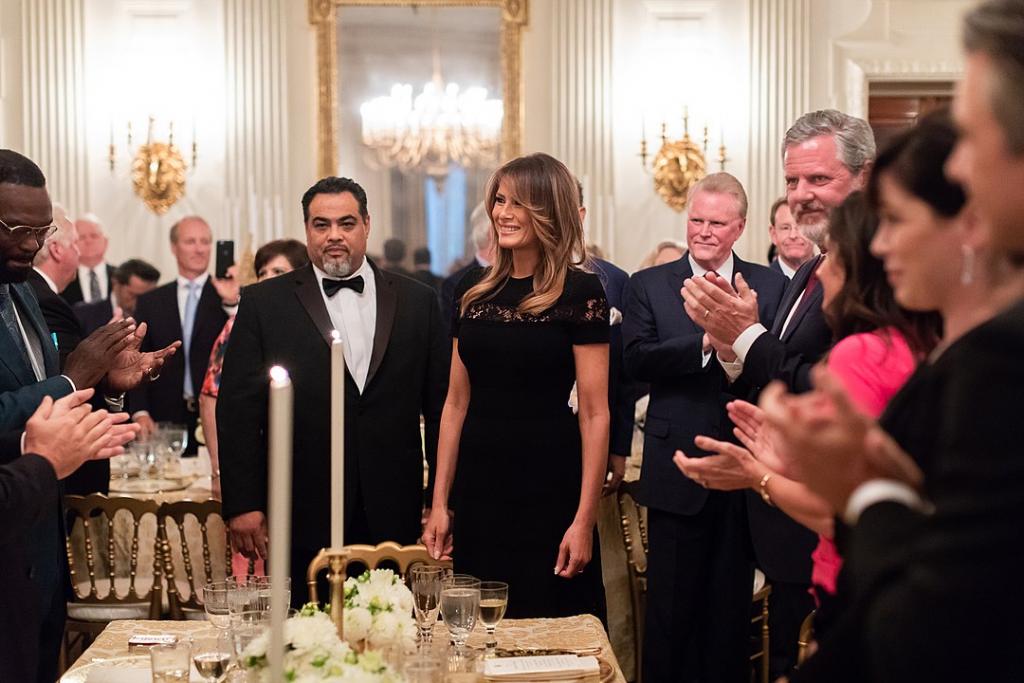White evangelicals are doubling down on President Donald Trump. Their choices in 2016—Trump or Clinton—may have been distasteful to them then. But in 2019, their taste for Trump is heightening, even without a singular evil liberal personality yet serving as his foil.
To be sure, not all evangelicals are jumping on board. Christianity Today editor Mark Galli, prolific blogger and historian John Fea, Atlantic writer Peter Wehner, Liberty student Rebecca Olsen, academician-activists Ron Sider and Richard Mouw, and many others have offered a steady stream of criticism.

These and other bracing rebukes of co-religionists who voted for Trump, however, have not done much to stem support for the president. The divide between cosmopolitan evangelicals and populist evangelicals is too entrenched. In one of the most sobering scholarly articles I’ve ever read, James Guth shows that the “Populism Syndrome”—marked by “nationalism,” “authoritarianism,” “rough politics,” and “compromise bad”—is disproportionately practiced by evangelicals. Guth writes, “Populist Syndrome scores are a better predictor of a Trump vote among Evangelicals in 2016 than are party identification and ideology combined.” He continues, “White Evangelicals share with Trump a multitude of attitudes, including his hostility toward immigrants, his Islamophobia, his racism and nativism, as well as his political style, with its nasty politics and assertion of strong, solitary leadership.”
Not only are white evangelicals sticking with Trump, but their voices matter disproportionately. Even though they have dropped as a percentage of the population—from 23 percent in 2004 to 15 percent in 2018—their percentage of the electorate has remained steady. What fuels the Republicans’ political strength, explains Robert P. Jones, “is not current white Christian population levels, but the fact that white Christians historically turn out to vote at higher rates than nonwhite and non-Christian Americans.”
Evangelical cosmopolitans have long tried to overcome what they see as populist deficits. In the 1940s Carl Henry and Billy Graham launched the neo-evangelical project in an attempt to clothe fundamentalism in more respectable garb. From the 1970s onward, members of the evangelical left, editors at Christianity Today, and former George W. Bush speechwriter Michael Gerson have told inspirational stories of nineteenth-century abolitionists and suffragettes. Many white evangelical leaders now speak of the importance of recovering themes of marginality, pilgrimage, and lament that they say have always pervaded their sacred texts. There is a strong sense among many, especially missionaries, humanitarian workers, pastors, and evangelical professors, that they live in a new global age that requires a missiology of peace and a posture of submission, not a reassertion of Pax Americana. For many decades, these elites have sought to narrate the evangelical movement as more cosmopolitan than it has actually been.
But they are reinforcing their cosmopolitan script with a selective historiography that does not reflect the full sweep of evangelical identities. Abolitionists never really represented the mainstream of evangelicalism. There were always more slaveholders and white Jacksonian patriarchs in the nineteenth century than Tappan brothers and Grimke sisters who championed social justice causes. Though some evangelical leaders have sought to refine the term in ways that minimized support for Donald Trump, they do not speak for most rank-and-file evangelicals. There continues to exist a vast subterranean populism that upsets establishment vanities.
As Guth contends, “The pervasive populism of white Evangelical laity not only helps explain their support for President Trump, but suggests powerful barriers to influence by “cosmopolitan internationalist” evangelical elites, who want to turn the community in a different direction. . . . Indeed, the vocal populism of many of the conservative Evangelicals filling President Trump’s religious advisory council is probably more representative of the community as a whole.”
David French, a conservative anti-Trump evangelical, tweeted it like this:
About that recent polling showing zealous Evangelical opposition to impeachment — The “lesser of two evils” mask is off. The alternative here isn’t Hillary but Pence.
Under similar facts for a Democrat, they’d want to remove.
These Evangelicals are just Trumpists now.
— David French (@DavidAFrench) October 21, 2019
Or is it even worth trying to identify representativeness? The notion of a coherent evangelicalism—whether represented by cosmopolitans or populists—has always been a fiction. It is an imagined community that allows self-identifying members of many stripes to claim the label. Which one you most see depends on your access point. Do you hang out at an InterVarsity chapter at Harvard? Do your friends watch Huckabee on FOX News? Do you study sociology at Wheaton College? Do financially support traditional missionaries who think that spiritual conversion will solve poverty? Do you interact with highly educated evangelical humanitarian technocrats who collaborate with the United Nations?
Each of these persons can make an authentic claim to evangelical identity. But if you were only hanging out in the faculty lounge at an evangelical college or with humanitarians at an evangelical NGO in Phnom Penh, there’s a good chance you were shocked by the 81 percent. The election exposed the many evangelicalisms that have been there all along.












